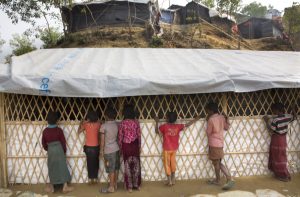The Rohingya refugee crisis, which entered its fifth year in August, is showing no signs of winding down. Repatriation of refugees is nowhere in sight, even as management of the large number of refugees that Bangladesh is hosting is getting increasingly complex for its government.
On September 29, Mohibullah, an influential Rohingya community leader, was assassinated by unidentified men near his office in Lambasia in the Kutupalong camp, just a few hundred feet away from two police stations.
While speculation is rife over the identity of his killers, Mohibullah’s brother blamed the Arakan Rohingya Salvation Army (ARSA) for the killing in a video posted on social media shortly after the assassination.
“Bangladesh authorities should urgently investigate Mohibullah’s killing along with other attacks on Rohingya activists in the camps,” Meenakshi Ganguly, Human Rights Watch’s South Asia director said a statement, adding that the murder is a stark reminder of the risks faced by those in refugee camps for speaking up for freedom and against violence.
On October 2, Bangladesh Foreign Minister A.K. Abdul Momen told journalists that Mohibullah was assassinated by groups with a “vested interest,” since he advocated for safe and dignified repatriation of refugees back to Myanmar’s Rakhine State.
In addition to hosting ARSA militias, the Kutupalong refugee camp is known to be a hotbed of trafficking rings and criminal gangs who terrorize camp residents by night. There have been several incidents of violent crimes including robberies, assaults, abductions, and killings in this camp.
Analysts believe that Mohibullah’s nonviolent and democratic approach to solving the Rohingya crisis angered groups that viewed armed resistance as the only solution to the crisis. Nur Khan, a prominent human rights activist in Bangladesh, told Deutsche Welle that Mohibullah’s killing was part of an elaborate plan to leave the refugee community without a civilian leader. “You can’t solve a political problem only militarily. That’s why a leader like Mohibullah, who emerged from a civilian community, was important to solving the crisis,” Khan said.
In a 2019 Reuters interview, Mohibullah predicted that he would be killed by hardliners in the camps who were sending him death threats. Not only Bangladeshi police but also the United Nations and foreign embassies failed to protect Mohibullah although they knew that his life was under threat, Nay San Lwin, a co-founder of the Free Rohingya Coalition, told DW.
The repatriation of Rohingyas had been put on the back burner partly because of Myanmar’s unwillingness to take back the Rohingya refugees but also because international focus has shifted from the Rohingya crisis to the military coup in Myanmar and a looming civil war there.
Mohibullah’s assassination has brought back attention to the Rohingya repatriation issue. It has forced uncomfortable questions to the fore. Are there vested interests behind keeping the refugees in Bangladesh?
On October 5, Foreign Minister Momen said that while Bangladesh is talking about repatriation, “several international agencies are talking of long-term rehabilitation. There has been no conflict in Rakhine for the last four years; yet, they (agencies) do not tell them (Rohingyas) to repatriate. All they (agencies) talk about is keeping them in good condition and about their human rights here.”
Momen endorsed Prime Minister Sheikh Hasina’s observations a day earlier that the Rohingya camps have become a place of business for the NGOs and aid agencies working in Cox’s Bazar.
“They (agencies) are making absurd demands like giving Rohingyas the right to buy land, giving opportunities in employment and proper schooling. But these are not acceptable,” the foreign minister said, adding that the intention of the NGOs and agencies in the Rohingya camps is to have the refugees stay in Bangladesh. “If they (Rohingya) stay here, their (agencies’) employment will be extended,” Momen pointed out.
The renewed discussion of Rohingya refugees came amid the Bangladesh government signing a Memorandum of Understanding with the U.N. under which the global body will provide humanitarian support to the Rohingya refugees on the remote island of Bhasan Char.
Just 34 percent of the $1 billion needed to take care of the Rohingya refugees has been disbursed to the Bangladesh government and aid agencies. With the Taliban’s recapture of power in Afghanistan humanitarian needs in that country are expected to soar, which means that funds for the Rohingya camps in Cox’s Bazaar will be cut back further.
The Bangladesh government has been lobbying at many global forums including the U.N. General Assembly to ensure safe and dignified repatriation of the refugees back to Rakhine. Will Mohibullah’s murder bring global attention back to the refugee camps in Bangladesh?

































